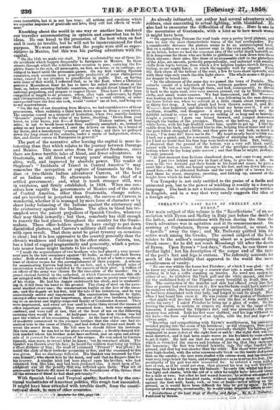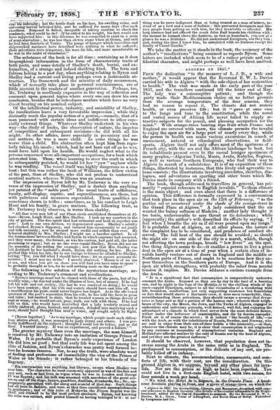. THELAWN f ' S. LAST BAYS OF SHELLEY AD
BYRON.* .
TEE main subject of this voluble is the "Recollections" of an as- sociation with Byronand Shelley in Italy just before the ' a4eh of the latter, and communieations with Byron .during the time the Greek adventure was in agitation and at its commencement. On arriving at • Cephalonia, Byron appeared inelinect;- as usual, to " davielle " away the 'time ; and Mr. Tielawnt quitted him for actire. Work iniong•the Greeks. The, -seeend subject of the book relates . to the author's campaigning 'about as a- partisan of the Greek cause ; for he did net reach -Missolongi till after the -death of Byrn. Ups& Byron's " lastday•s," -therefore, be can tiro* no further light; but hia description of the corpse and of the state of the poet's feet and legs is curious. - The infirmity accounts far much of the irritability that -appeared - to the world the Mere
sensitiveness of vanity. • •• .- . • - . . .
"No one wag within the house-but Fletcher;: of whichl was glad.:- -•As if he knew my-wishes, he led me up ii.narrew Stair into4 ..areaWypomoyith nothing in it but a coffin -standing on trestles, Na Turd,wikaportalbl, either of us ; he withdrew 4114110k pall' and the Whi - - Jihere
. n . lay the 'embaltnedbody of the Pilgrim—more heauti In life. The contraction of the muscles and skin had efra,
Often I had heard him curse it. He was jealous of the ,-,e ila'rof S'.14'.111Di'iall:tsielpillIty;:lai time or passion had ever traced on it ; few marble buste- its stainless 'white, the harmony of its proportions, and, . he had been dissatisfied with that body, and longed to miet; —that Might well be—but where had he seen he tae,e,-,o.e.form worthy to excite his envy'? I asked Fletcher-to bring me a • latia, Oflittiter. 011 his lameness, • I uncovered- the .Pilgrith's feet, • 44', ' -itifiweied—the great I leaving the toom, to confirm or remove my , doub 'ii the cause of his mystery was solved. Both his feat e-ere cluld4d,l'ii 'ilea withered to the knee—the form and features of an Apollo, wAth tthv fpep fled kgs of a Sylvan satyr. * *. * - - , . If. I .: . - "Knowing and synipathizing with By'reekitefilibitea's, hie 0-es°.ciat,e1 avoided prying into the cause of his !emetic* 1 -''-ito il, sftmogers, from go breeding or common hinnanity: '-It ,wai-gelierally thilliglit his hating gait originated in some defectof : the rightfostorank/e-tAkf ItigliVafit. was the ihost distorted; .-and it had been made value ,-in-Lbielibyhifod{bYfl'ailvett°r“ to set it right. -Jut-told me that far myeritl; im,-,iy.c ateeliaitia% which so wrenched the sinews and let1411;1* ioPhislc&-kil . his laineneas;'• the foot was twisted: instate , b -A. if' grimed, and' that leg-was shorter, thiniltheOtlitIrli veryhigh-heeled, with the seleetincomnionlyihick- ett-th Undo:,fl Wu on titeoutside; the taes-xtittituallwith coati:a-Woolf itudibiortioniers were very large her the litie4,391datrapped-doyin so,fism-govetliialettl't peculiarity Of his gait Was now accounted for: he entered a room wit s sort of run, as if he could not stop,- then planted his beat leg well fdlytfird; throwing backlis body to kesp,htS belantiNiflitreittly Paine ivas light and elastic, Exrithrthe Isi of A '.sitek heirrighttiAie fettered - hlotig for a mile or two; • bntiafter he had waxed heavier; >- helieldesilittonsPscit walk more than -a few hundred- Yards, without sqiiiitting; dertn or leaning against the -first wall, hank, rock,•-or• ties at hartib.e.'never sitting on the ground, as-lt would hate been .diftleult "fcir Mm1 be' got tip Spin. lU company Otletrungersi.kieessianaily; he would melte tifflati tei.117-.; • 1Woltrettaiet of' tital.4# Daitr*Artrit Published by Maxon. , •' - . ' . ' • . lata -•
ceal his infirm IIUIC hectic flush on his face, his swelling veins; and
quivering neri• and he suffered. for many. days rfter Such etertions. Disposed to fatten, incapable of taking. exercise tO eheckathe tetidencY,..what could he do If he added to his weight, his feet would not have supported him : in this dilemma he was compelled to exist in a state of semi-etarvatien ; lie was less than eleven stone when at Genoa, and Said heilad.beenfoniffen at Venice. The pangs of hunger which travellers and shipwrec1fe4 Mariners have described were nothing to what he suffered; their Plivationsi.weic temporary, his were fol. life, and More unendurable as he was in the midst of abundance."
, The siihstance of the book is for all time ; containing as it does 'biographical information in the -form . of characteristic traits of beth1O6ts, and some 'details of Shelley'S death, burial, and ex- hiation of a strange and indeed Shocking kind. The feria and gu004g a past day, whexianYthingrelatingstoByisns and fahelleysluid a current and living perhaps: even a fashionable :at- traction. The framewerk and the minutia) of daily occurrences, -Which of neeessitV take`- plebe- in personal rerniniaceitces are of little account to tlie readers of another generation.. Perhaps, too, Mr,..Teelliwity is needlessly expansive in the way of, reflection and comment upon general topics where .every onesean draw his own conclusion, besides that he introduces matters 'which have no very direct-bearing on his nominal subject. ' Of_ the intellectual power, industry, ,ae.d. amiability ef Shelley, the ireWleetions leave„ it very favourable impression ; while:they distinctly mark the popular. notion of-a geniuss—namely, that of a man possessed 'with certain ideas and indifferent to other espe- cially external things. Whatever Shelley' undertook in his (sift way—the study of books, 'the observation of nature,"the impetus ofscOmpoSition , and subsequent revisions—he did with: all, his might. In . other affairs; more especially in pecuniary and so- cial niatteriq slie was a mere- child. . In some things be :was worse than a child. His abstraction Often kept hint froin regu- larly taking his meals ; which had: he not been cut off as be was, must have _told would neglect what to the persons eoneerned were all-important occupations, fora book which interested him. Thus, when learning to steer the craft in which he subsemiently perished, he would let- her "yaw" anyhow while he Was reading: The vessel itself was highly dangerous as a sea- boat; but this was 'rather the fault of Williams, the fellow victim of the poets.:than of Shelley, who did not profess • to .understand nautical matters, whereas Williams was an amateur. -The inipreetion of. Byron left by Mr. -Trelavnly is the very re- verse of the irapression. of Shelley, and is darker than anything yet -painted of-the.'" noble poet." The usual traits of selfishness, vanity; self-display, caprice; 'and. superciliousness, are there, but with paltriness and meanness superadded. These qualities are sometimes shown in trifles ; sometimes, as in his conduct to Leigh Mint and his familY,r- in grave Matters. The following trait, -as Mr. Trela,vvny truly observes, is worse tlian. shabby.. "Ali that were now left of our Pisan circle established themselves at Al- beie-s-Byrons Leigh Minn, and Mrs.' Shelley. 1 took up my quarters in -the city of' nflates. '.The tine spirit: that had animated and held us together Was gone ! Left to Our own devices, we degenerated apace. Shelley's solidity had checked Byron'.s flippency, and induced him occasionally to. act justly and' talk seriously; now no seemed' more sordid and selfish than ever. .He behaved shabbily t Shelley; 1 Might Use a harsher epithet. In all the transactions between Shelley and Byron in which expenses had occurred, and they were many, theformer, as was his custom, had paid all, the latter promising to repay; -but as , an:ohie ever.repaid,Shelley, Byron did not see the necessity of .his setting the example; and now that Mrs. Shelley was left .destitute by her husband's :death, Byron did nothing for her. Ile re- gretted this 'when top lath, for iii our voyage to Greece he alludedlo,Shelley, saying; Tre, you did What I should have done; let us square accounts to- mortOw; I mist 'pay: My debts.' • I merely observed, 'Money' is of no use at sea, and when you get on shore you will find you have none to spare ' : he probably thought so too, for lie said nothing more on the subject."
The:following is the solution of the mysterious marriage, ac- cording to Mr.: Trelawny's comment and recollections.
"l3yron's marriage must not be classed with these of the poets, but Of the worldly wise,—be waSInotunder the illusion of love, but of money. if he had left his wife and cut sodety, (the last he was resolved .on doing,) he would h content; aVebeen connt ; that his Wife aid soeiety shoidd have east kiln off, was a mortification his pride could never forevener.fotget. - Asto the eft-vexed question of the poet's separation from his wife, he has told the fads in prose and verse; but omitted- to state, -that he treated womeit as things devoid of soul or eense,—he would not eat, pray, walk, nor talk With' them. If he had told us this, who would have marvelled that 'a lady tenderly reared and richly endowed., Pions, learned, and prudent, deluded into marrying such s man, should have thought 'din "mad or worse, and sought safety by flight.
a *
"[Byron loquitur.) - 'Ai to mymarriage, which peopleMade such ddicii- loos !dories about, it was manned by lemfy Jersey and others. I was per- fectly indifferent on the sulije'd thouglitI could not do better, and: so did they: I Wanted money. rrt *eh an experiment, and preyed a ailiire.' "
The greater, mystery than even the niarriage, the man himself, is resolved by Mr. Trelawny into au-imitation. of George Prince of Wales. It is probable that Byron's' early experience of London life did him no good ; but that early life was not spent among the elite of fashion, and Byron'a character, was pretty well fornied
be- fore he became famous. Nor, tx; say the truth, were absolute want of feeling and professions of insensibility the vice of the Prince tif Wale's or his friends; it rather -belonged to his friends of the
Regency, ", . • . ,
conversation was anything but literary, except. when Shelley was near him. The.ebareater he most commonly appeared was of the free and easy sort, such : °ee in Yolgue. when he was in London and George IV was Regont;. and his talk was sesseued with aueedeteff of thereat act- ors wand off the itage, hexer% gamblers, duellista, drunkards, &e., ap- proptiately garnished witlithe ehang and scandal of that,dity, Sochihings had all heen in fashion, awl Were. st-that time considered accomplishments by..gentlemen ; mid of this tribe Mohawks,the -.Prince Regent was the chief; Mel allowed to be 'the 'Most perfect Specimen. Byron; not knowing the tribe was extinct, still prided himself on having belonged to' it: at no- thing was he more indignant than at being treated is a man of letters, in- stead of as a lord and a man of fashion this prevented foreigners and lite- rary people from getting on with him, for they invariably so offended. His long absence had not effaced the .-mark Z B ahn ull brands ide,ehildren with; the instant he loomed above ie _hwizop, onfeetes boxvoliack, you, saw at a glance he wean Britisher. Head not.tnuktatend foreigners, nor they him: and, during the time I knew him, he associated with no Italians except the family of Count Gamba."' , We take the matter a,s:it stands in the book' theiltecaracy of the
. , author's " reecilleCtiotia "'being assiiined as regardSBY-ren. ..Some letters are included which seem, to be of a rather private and 'con- fidential character, and might perhaps as well haVe.beetissinitted,



























 Previous page
Previous page